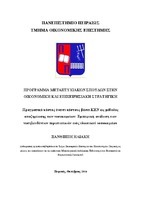Πραγματικό κόστος έναντι κόστους βάσει ΚΕΝ ως μέθοδος αποζημίωσης των νοσοκομείων : εμπειρική ανάλυση των νοσηλευθέντων περιστατικών ενός ιδιωτικού νοσοκομείου
Actual cost versus DRG-based cost for hospital reimbursement : an empirical analysis of hospital episodes in a private hospital

Προβολή/
Λέξεις κλειδιά
Προοπτικός μηχανισμός αποζημίωσης ; Μίγμα περιπτώσεων ; ΚΕΝ ; Αποζημιώσεις ; Νοσοκομεία ; Diagnosis - Related Groups (DRGs) ; Prospective payment system ; Case mixΠερίληψη
Η εισαγωγή των ΚΕΝ ως προοπτικός μηχανισμός αποζημίωσης των
νοσοκομειακών μονάδων αποσκοπεί στην ενίσχυση της νοσοκομειακής αποδοτικότητας, στη
βελτίωση της ποιότητας υγειονομικής περίθαλψης και στη σταθεροποίηση των δαπανών, στη
μείωση του κόστους νοσηλείας και δίνει κίνητρο στα νοσοκομεία για την αποτελεσματική
χρήση των πόρων τους.
Η παρούσα μεταπτυχιακή έρευνα αποσκοπεί σε μια διεθνή ανασκόπηση των
Ομοειδών Διαγνωστικών Ομάδων (Diagnosis Related Groups – DRGs) καθώς και στη
διερεύνηση των επιπτώσεων εφαρμογής των ΚΕΝ στην Ελλάδα σε ιδιωτική κλινική.
Με επεξεργασία από το στατιστικό πακέτο Stata MP 13, θα
συγκριθεί η μικροκοστολόγηση όλων των εισαγωγών και των υπηρεσιών που προσφέρθηκαν
σε ασθενείς για τέσσερα έτη όπως έχουν διαμορφωθεί οι τιμές στο κρατικό τιμολόγιο, με την
εφαρμογή των ΚΕΝ στα περιστατικά όπως αυτά ισχύουν μετά από αντιστοίχιση όλων των
διαγνώσεων ICD-10 με τα ΚΕΝ.
Από τα αποτελέσματα της έρευνας, είναι φανερό πως υπάρχουν αποκλίσεις
του κόστους που υπολογίστηκε για το κάθε περιστατικό και του κόστους των ΚΕΝ. Σε
κάποιες περιπτώσεις το πραγματικό κόστος νοσηλείας ήταν υψηλότερο του κόστους
νοσηλείας για τα ΚΕΝ και αντίστροφα. Το ίδιο ισχύει και για την πραγματική διάρκεια
νοσηλείας και τη μέση διάρκεια νοσηλείας όπως αυτή προβλέπεται από τα ΚΕΝ.
Παρατηρήθηκαν μάλιστα περιπτώσεις στις οποίες, ενώ το πραγματικό κόστος νοσηλείας ήταν
υψηλότερο από το προβλεπόμενο μέσο κόστος από τα ΚΕΝ, η πραγματική διάρκεια
νοσηλείας ήταν χαμηλότερη από τη μέση διάρκεια νοσηλείας που προβλέπεται από τα ΚΕΝ
και αντιστρόφως. Αυτές οι αποκλίσεις κρίνονται αρκετά σημαντικές, με αποτέλεσμα τα ΚΕΝ να
χρειάζονται επανεκτίμηση. Στο μέλλον, είναι χρήσιμο να πραγματοποιηθούν τέτοιου είδους
μικροκοστολογήσεις – εκτιμήσεις στα νοσοκομεία, όπως και αυτή που έλαβε χώρα στην
παρούσα εργασία, προκειμένου να προσδιοριστούν με ακρίβεια οι τυχόν αποκλίσεις, να γίνει
ανασχεδιασμός του μοναδιαίου κόστους των ΚΕΝ και σε ορισμένα σημεία ίσως και ολική
αναθεώρηση. Έτσι, τα ΚΕΝ θα μπορούν να αντιπροσωπεύουν το πραγματικό κόστος της
περίθαλψης.


